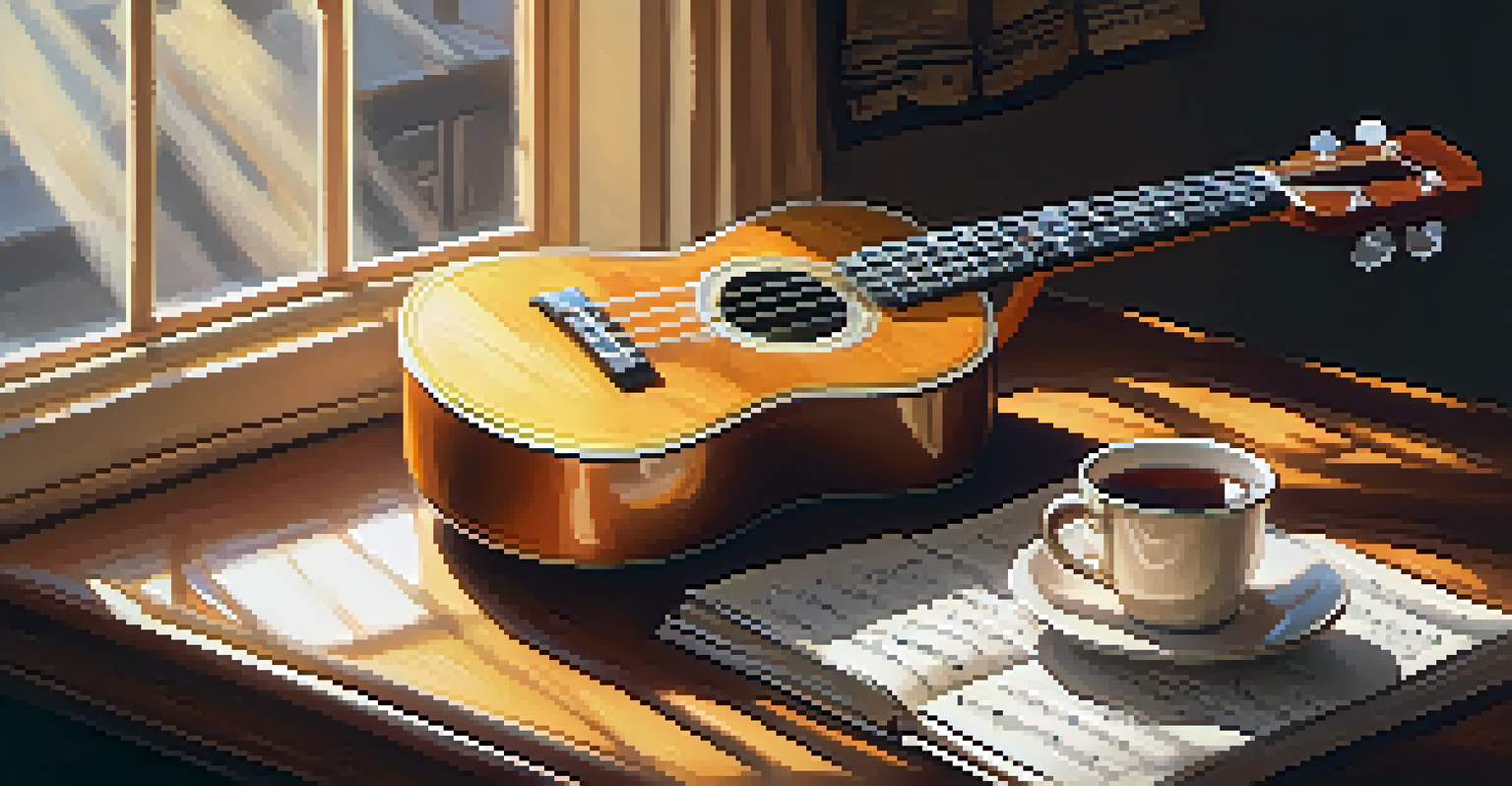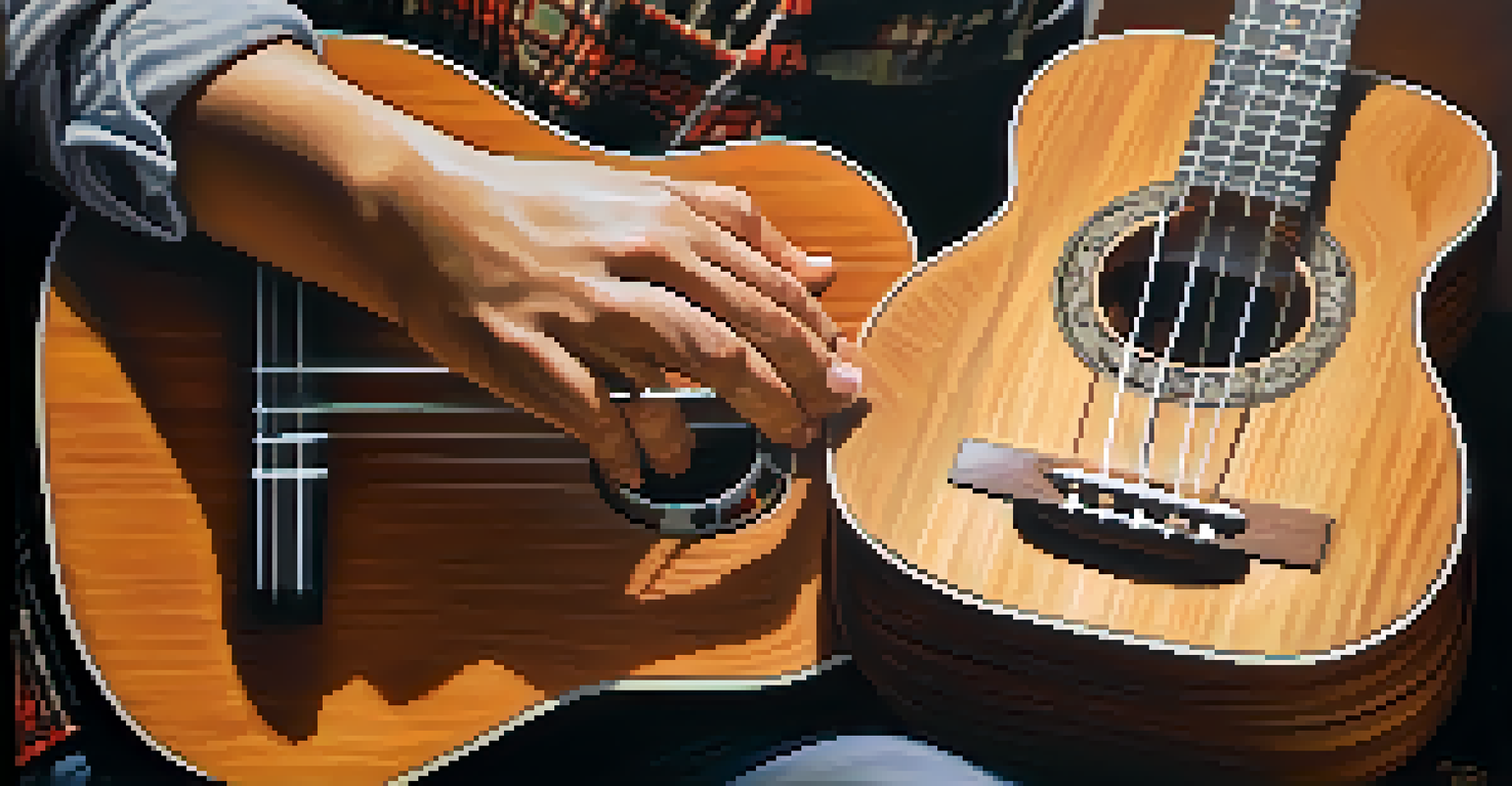Top Ukulele Chords Every Songwriter Should Master

The C Major Chord: Your Foundation for Many Songs
The C Major chord is a staple for any ukulele player, especially songwriters. It's one of the easiest chords to learn, making it perfect for beginners. This chord forms the foundation of countless songs across various genres, from pop to folk.
Music can change the world because it can change people.
Imagine strumming a sunny tune; the bright sound of the C Major can instantly lift your spirits. It’s a go-to chord that opens up a world of musical possibilities. Once you master C, you’ll find it’s a stepping stone to creating more complex chord progressions.
As you explore songwriting, try pairing the C Major with other chords like G or F. You'll quickly discover how versatile this chord is, making it essential for any songwriter's toolkit.
G Major Chord: Add Brightness to Your Melodies
The G Major chord brings a bright and uplifting quality to your music. It’s slightly more complex than C Major, but worth the effort as it complements many songs beautifully. You’ll often find it in the company of other major chords, creating a rich harmonic experience.

Think of G Major as the sunshine peeking through the clouds; it adds warmth to your songs. This chord can elevate a simple melody, giving it depth and character. Plus, it’s often used in popular tunes that you may already know, making it even more relatable.
Essential Chords for Songwriting
Learning chords like C, G, and A Minor provides a strong foundation for crafting a variety of songs.
When you combine G Major with C and D chords, you'll create a popular chord progression used in many hit songs. Embrace G Major, and watch how it transforms your songwriting journey.
The A Minor Chord: A Touch of Emotion
The A Minor chord is your gateway to expressing deeper emotions in your songwriting. Its somber sound contrasts beautifully with major chords, adding complexity to your music. Whether you’re writing a ballad or a reflective piece, A Minor can help convey the right mood.
The beautiful thing about music is that it connects people.
Think of A Minor as the gentle whisper in a conversation; it adds a layer of intimacy to your songs. It’s often used in combination with C Major to create poignant moments that resonate with listeners. Mastering this chord will enhance your songwriting palette significantly.
Experiment with A Minor in various progressions, and you'll notice how it can shift the tone of your music. Pair it with G Major or F Major to unlock a world of emotional storytelling.
F Major Chord: A Versatile Addition to Your Repertoire
The F Major chord is another must-have in your songwriting arsenal. It’s versatile and can seamlessly fit into many chord progressions. Learning F can initially be challenging, but once you get the hang of it, your playing will become more dynamic.
Picture F Major as the bridge connecting two sides of a river; it provides a transition between different musical ideas. This chord pairs wonderfully with C and Bb, creating beautiful, flowing melodies. It's commonly found in folk and rock music, making it a favorite among songwriters.
Emotional Depth with Minor Chords
Incorporating minor chords such as A Minor and E Minor adds emotional complexity and richness to your music.
Practice incorporating F Major into your songs, and you'll find that it adds a new layer of interest. The ability to switch between major and minor chords can transform a simple song into something captivating.
The D Major Chord: Bringing Energy and Movement
The D Major chord is known for its bright and lively sound, making it a fantastic choice for upbeat songs. This chord adds energy and movement to your music, helping you create engaging melodies. While it might take some practice to master, the payoff is well worth it.
Imagine D Major as the spark that ignites a fire; it brings excitement to your compositions. This chord often pairs with G and A, forming popular progressions that are easy to play and fun to sing. It’s a great way to add variety to your songwriting.
Experiment with D Major in different styles, and you’ll find it works well in everything from pop to country. Its vibrant sound encourages creativity and helps you explore new musical ideas.
E Minor Chord: Adding Depth and Contrast
The E Minor chord is essential for adding depth and contrast to your music. It provides a beautiful balance to the bright sound of major chords, allowing you to create more complex emotions in your songs. This chord is often found in intros and verses, setting a reflective tone.
Think of E Minor as the shadow that enhances the light; it adds richness and intrigue to your melodies. Pairing it with C or G Major creates a compelling contrast that can captivate listeners. It’s a chord that invites exploration and experimentation.
Exploring Chord Progressions
Experimenting with different progressions and transitions, like using B7, can enhance creativity and keep your compositions engaging.
As you work with E Minor, consider how it can transform your chord progressions. Its unique sound can lead to unexpected musical moments, making it a vital component of your songwriting toolbox.
The B7 Chord: A Perfect Transition Chord
The B7 chord acts as a fantastic transition chord, bridging the gap between different sections of your song. Though it may seem a bit tricky at first, mastering B7 will open up new possibilities for your songwriting. It’s often used to create tension that resolves beautifully into other chords.
Imagine B7 as a springboard; it propels your music forward and keeps listeners engaged. This chord can lead back into E Minor or A Major, enhancing your progressions and adding an element of surprise. It's a great way to keep your audience on their toes.

Practice incorporating B7 into your progressions, and you’ll find it adds a dynamic quality to your songs. The more you explore, the more you’ll appreciate its role in creating exciting musical moments.
Mastering These Chords Will Unlock Your Creativity
Incorporating these essential ukulele chords into your songwriting can unlock a world of creativity. By mastering C, G, A Minor, F, D, E Minor, and B7, you’ll be well on your way to crafting memorable tunes. Each chord brings its own unique flavor, allowing you to express a wide range of emotions.
As you practice these chords, experiment with different progressions and strumming patterns. This exploration will lead to new ideas and inspire your songwriting journey. Remember, the joy of music lies in creativity, so don’t be afraid to break the rules.
Ultimately, mastering these chords will give you the confidence to express yourself through your music. Embrace the process, enjoy the journey, and let your unique voice shine through your songwriting.